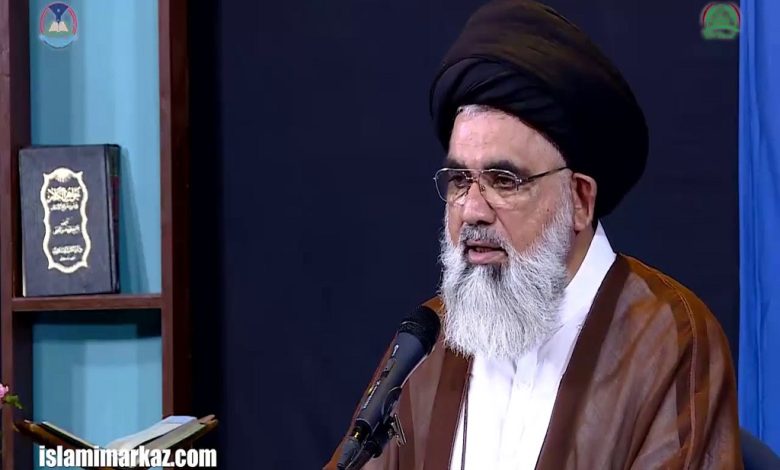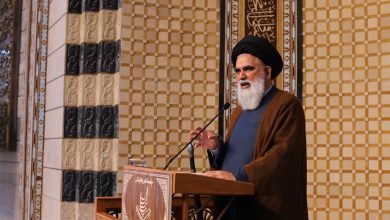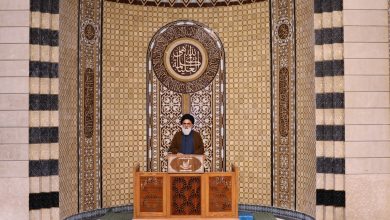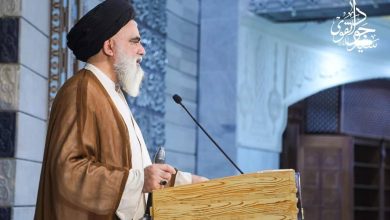
Hujjatul Islam Ustad Syed Jawad Naqvi
(Principal Jamia Orwatul Wuthqa – Lahore)
Delivered at: Masjid Baitul ul Ateeq
Lahore – Pakistan
Friday Sermon 30th May – 2025
Sermon 1: Taqwa in protection from wealth – Ghanimah
Sermon 2: Debate of Imam Raza (a) with Ghaali
The economy plays a crucial role in human life, and this domain also demands a specific form of Taqwa (God-consciousness). Allah has provided various legitimate means of earning for humankind, primarily categorized into agriculture, trade, industry, and services. All these fields involve effort and hardship. However, there exists another form of income that is not acquired through these four conventional categories. This is known as Ghanimah—a type of gain that comes without prior intention or targeted effort, such as discovering a hidden treasure or obtaining war spoils from a defeated army.
The term Ghanimah originates from Ghanam, meaning livestock. In ancient times, livestock represented the primary assets of communities. Before Islam, when one tribe defeated another in battle, the victors would seize livestock and other resources. This form of acquisition came to be known as Ghanimah (war booty) and was later extended to include any gain obtained through warfare, including weapons and other valuables. The Quran uses this term to denote such gains, and Islamic jurisprudence (Fiqh) also applies it to any surplus wealth acquired without specific labor.
Within a person’s total assets, a significant portion may come from Ghanaim—wealth not earned through direct effort. This type of wealth, according to Islamic teachings, belongs to the Islamic state. It is the responsibility of the rightful ruler—under an Islamic government—to distribute it in accordance with divine guidance. Since this wealth is considered to belong to Allah, it must be utilized by His representative. In periods where an Islamic state does not exist, such as during the Imams’ era, the authority over Ghanimah was vested in the Imams, excluding state control. After the era of the Imams, their representatives were supposed to manage this wealth, but this system eventually collapsed.
In contemporary times, anyone appearing in the guise of a scholar may claim the right to receive and distribute Khums (one-fifth portion of certain types of wealth), often doing so without adhering to the strict religious criteria. Many who access this wealth justify their actions with self-serving arguments. In the absence of a legitimate Islamic government, religious rulings do exist that specify how and where such wealth should be spent. These responsibilities fall on trusted scholars and, in some cases, even on the believers themselves—but only within defined boundaries.
This subject requires deeper analysis regarding wealth ownership and distribution. However, in brief, Ghanaim is a distinct type of wealth about which the Quran has provided clear guidance on usage. This is because certain things are perpetually at risk of corruption, and wealth is among the most vulnerable. Wealth holds universal appeal—people desire not only what belongs to them but also what does not.
Another area of vulnerability is women, particularly in relation to men’s desires. Women are inherently attractive to men, and thus the Quran has instituted measures for their protection. Women are also instructed to safeguard themselves from inappropriate male attention. However, in today’s digital age, many women are unknowingly exposed—carrying mobile phones, IDs, and social links accessible to others. Therefore, Allah’s system of protection extends to both wealth and women.
Wealth must be safeguarded according to this divine design. Humanity has misused communal resources, inheritance, and governance-related wealth—and in turn, wealth has consumed humanity. This raises a profound question: has man misused wealth, or has wealth corrupted man? Although it may appear that man is usurping wealth, in reality, wealth is subjugating man. The core principle of Taqwa in wealth is to protect oneself from the destructive nature of wealth. The truly noble person is one who remains immune to wealth’s corrupting influence.
Imam Ali (a) stands as the highest example of one who remained untainted by wealth. Unfortunately, some scholars today gain knowledge not to foster righteousness, but to justify their wrongful acts—particularly the misuse of wealth. They lack Taqwa in financial matters and attempt to mask their shortcomings through acts of worship, fasting, or religious mourning (Azadari), portraying a façade of piety.
This issue is addressed in Surah Al-Anfal, verse 69 of the Quran, which commands an important ruling regarding the rightful handling of such wealth.
فَكُلُوا مِمَّا غَنِمْتُمْ حَلَالًا طَيِّبًا ۚ وَاتَّقُوا اللَّهَ ۚ إِنَّ اللَّهَ غَفُورٌ رَحِيمٌ {69}
Eat then of the lawful and good (things) which you have acquired in war, and be careful of (your duty to) Allah; surely Allah is Forgiving, Merciful
You are permitted to consume what comes to you as Ghanimah (war bounty), but there are two essential conditions: first, it must be Halal (lawfully permissible), and second, it must be Tayyab (wholesome and beneficial). These two are distinct concepts. Tayyab is not synonymous with Taharah (ritual purity), but instead refers to something that fosters growth and nurtures the inner potential of a person.
The word Tazkiyah, as mentioned in the Qur’an in relation to the mission of Prophethood, does not merely mean ritual purification; rather, it signifies nurturing and development. Similarly, Zakat does not imply simply extracting a portion of wealth; it means to grow and develop what Allah has bestowed upon us. In the deeper understanding of Tafsir, Itāʾu-z-Zakāt means “to bring forth growth”, not just to “give charity.” Zakat involves nurturing what has been entrusted to you by Allah—be it wealth, children, or character—so that it evolves and flourishes.
In this framework, Zakat applies only to those things that have the inherent capacity to grow. This nuanced meaning of Quranic terms has often been narrowed or distorted. For example, Taqwa and Tayyab have frequently been reduced to superficial interpretations. Halal refers to that which is legitimate and lawful, while Tayyab refers to that which yields positive outcomes and enhances spiritual and moral development.
Therefore, when a community resource or bounty reaches you, it should first be examined to confirm that it is Halal—that is, there are no religious prohibitions or conditions barring you from using it. Then, it must be assessed whether it is Tayyab—meaning, whether it will aid in the growth of your inner self and spiritual potential.
This explanation is particularly relevant to a verse of the Qur’an revealed after the Battle of Badr, where the Muslims achieved a miraculous victory. Approximately seventy prisoners were taken. Most of the Muslim soldiers, except for Imam Ali (a), began focusing on capturing prisoners rather than fighting, motivated by the pre-Islamic custom of ransoming captives for financial gain. Imam Ali (a), however, continued to strike down the enemy without hesitation.
Despite this divinely granted victory, many sought to benefit materially from it. They captured prisoners with the intent of acquiring ransom. When the Prophet (s) instructed that all prisoners except two should be released, it caused unrest among the companions, as they anticipated financial reward. A Quranic verse was then revealed, stating that they had no right to take captives until Islam had established full dominance. The goal of the battle was not material gain but the establishment of Islamic authority—which was to be measured by how many enemies were overcome, not captured.
However, since the captives had already been taken, Allah permitted the use of the ransom money on the condition that it be Halal and Tayyab. Yet the Qur’an reminded them that this was not the purpose of the war. It was their first major encounter with Ghanimah, and many were excited by the sudden influx of wealth, imagining an improvement in their lives. Hence, while permission was granted, it was accompanied by a firm reminder about the importance of Taqwa in wealth—along with Allah’s mercy and forgiveness.
The deeper message of this verse is not limited to the captives of Badr or that specific instance of Ghanimah. Rather, it conveys a universal principle: you must guard yourself against the corruption of wealth. Strive to embody Taqwa in your dealings with wealth—if only for a year—and observe the transformation. Imam Ali (a) used to say that “the world approaches me in new disguises each day trying to deceive me, but I say: go deceive someone else, for you shall not trap me.”
May Allah grant us the Taqwa needed to handle every blessing—especially wealth—with discipline, humility, and integrity.
SERMON 2
Imam Ali (a) is the guide for Taqwa. He (a) has told us:
.وَ قَالَ عليه السلام: هَلَكَ فِيَّ رَجُلَانِ مُحِبٌّ غَالٍ وَ مُبْغِضٌ قَالٍ
Two categories of persons will face ruin on account of me: he who loves me with exaggeration, and he who hates me.
In Saying No. 117, Imam Ali (a) states that two groups related to him will be annihilated, and indeed, this has occurred. The first group consists of those who commit Ghuluw (exaggeration), elevating his status to divinity out of excessive love. These people are certainly doomed. The second group is made up of those who harbor hatred toward him; they too are destined for destruction.
From Imam Ali (a) to the last Imam (a), the Imams have consistently and fiercely opposed Ghuluw, sometimes even more vehemently than they opposed tyrants. They specifically instructed the Shia community to distance themselves from the Ghulat (those who exaggerate the status of the Imams).
Imam Raza (a) emphasized this matter repeatedly, as seen in the traditions compiled in Bihar al-Anwar. We have reached Tradition No. 20, part of which we’ve already discussed. Continuing from there, Imam (a) says:
“O Allah! Keep us on the Sirat al-Mustaqeem”—the straight path of those blessed by divine bounty, not the path of those who have earned wrath or gone astray. Imam Ali (a) explains that Allah has commanded us to seek this path, which belongs to the Prophets, the truthful, the martyrs, and the righteous. The cursed path is that of the Jews, upon whom Allah’s wrath has descended. The “Zaalleen” (those who have gone astray) are those who distorted belief by practicing Ghuluw, such as the Jews and Christians who exaggerated in relation to their Prophets.
After narrating this verse, Imam Ali (a) says: “Anyone who denies Allah and His existence has truly gone astray.”
Imam Raza (a) further clarifies that those who raise Ali (a) to the level of divinity, denying his servitude (Abdiyyah) to Allah, are both cursed and misguided. He instructs the believers to preserve the status of servitude (Abd) for the Imams and then present their virtues as servants of Allah. These virtues are countless, and they endure because they are granted by Allah to His true servants. Imam Ali (a) warned: “Do not exaggerate in our status as the disciples of Isa (a) did by calling him the son of God.”
While narrating this tradition, someone in the gathering asked Imam Raza (a) to explain the essence of Allah. He said, “There are some among us who confuse the attributes of Allah with those of the Imams.” Imam Raza (a) replied: “Anyone who compares Allah with His creation will remain misguided all his life and will never find the right path. Such a person’s speech will always be incorrect.”
Then the Imam added: “I will describe Allah as He has described Himself. Though I have not seen Him with my eyes, I speak of Him through the observable signs He has given us. Allah has no physical form, cannot be sensed through our physical faculties, and cannot be compared to any of His creation. He is understood through His signs.”
I once told one of our teachers that most books on beliefs are written to refute atheists or deniers. These books try to prove the existence of Allah by beginning with the assumption that He doesn’t exist. This is incorrect. I advised them to restructure the belief curriculum in line with how the Qur’an introduces Allah—through His signs, not through philosophical denial and debate. Imam Raza (a) said: “Allah is distant, but not disconnected; present within everything, but not mixed or contaminated. The Qur’an says Allah is Al-Qayyum, meaning all things depend on Him. You try to prove Allah by turning believers into deniers first. For such debates, one must be as philosophically trained as Ayatollah Misbah Yazdi. Allah says: ‘I will show you My signs within yourselves and in the horizons.’ Present Allah through these signs.”
The Imam continued: “Creation obeys Allah to the extent that they recognize Him. Whatever is within the knowledge of Allah cannot be surpassed by creation. He is near, but not confined. He is far, yet not absent. He is present, without resemblance. He is One and indivisible. He is recognized through His signs, and there is no god but Him.”
At this point, the same person stood again and said, “May my parents be sacrificed for you, O son of the Messenger of Allah. I have a friend who claims that the attributes you have just described all apply to Ali (a)—therefore, he is Allah.”
Upon hearing this, Imam Raza (a) began trembling, and sweat appeared on his face. He exclaimed:
“Glory be to Allah! Far exalted is He above what these disbelievers claim! Do you not know that Ali (a) used to eat food like everyone else? Did he not drink water? Did he not marry? He lived like all other human beings, and yet he was humble before Allah and would prostrate to Him. Does Allah eat, drink, marry, or have children? If these qualities define divinity, then every one of you would be a god. These characteristics are found in all human beings.”
Still, the man remained stubborn and refused to accept the truth. Imam Raza (a) said that these Ghulat argue that the miracles of Ali (a) prove his divinity. They say that Allah manifested Himself in the form of Ali (a) to make His recognition easier. Despite all reasoning, the man did not relent, indicating the deep-rooted misguidance in his heart.
The Imam clarified: “These miracles were given by Allah to His chosen servants as proofs of their divine mission, not as evidence of divinity.”
This tradition will continue in the next session. May Allah protect us from this dangerous fitnah (trial of exaggeration and deviation).




